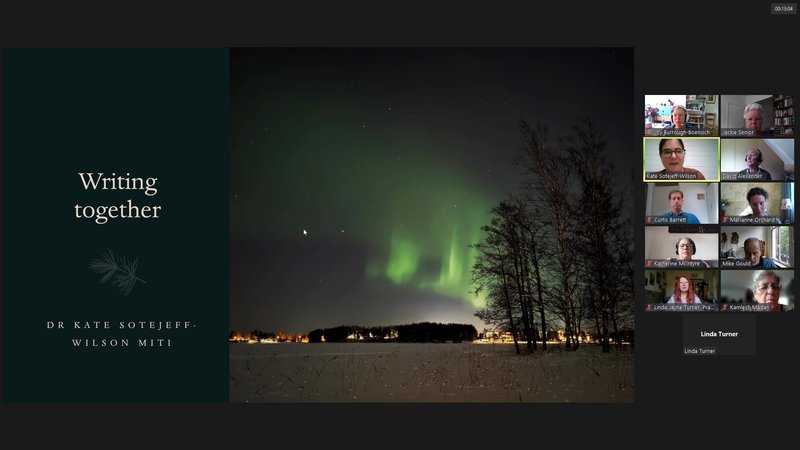
UniSIG report: Kate Sotejeff-Wilson on social writing: ‘Call it a meeting’
At the UniSIG meeting on 1 July 2022, Kate Sotejeff-Wilson talked about her experience of social writing with academics. Kate is a translator and editor, and she also facilitates writing retreats.
Social writing, Kate explained, is when a group of people get together, either online or offline, to write. The writers set goals together, the facilitator tells the group when to start writing and everyone works on their own project until the facilitator tells them to stop. The group then discusses how the writing went.
Kate mentioned a few things social writing is not: a workshop, in that you don’t critique one another’s writing; a boot camp, in that support is more important than productivity; teaching, in that the facilitator is a peer; and a competition, in that the writers are companions rather than competitors.
Who might benefit from social writing? Anyone, said Kate. Academics come to her retreats but so too do creative writers, and they inspire one another. ‘Someone who’s not involved in your work can see things you can’t see yourself.’ Translators could also try social writing, she added, because it gives you the chance to find your own voice and separate your voice from the author’s.
‘Can the writers be writing in different languages?’ Joy Burrough-Boenisch asked.
‘Yes,’ said Kate. Her social writing retreats are in Finnish and English. ‘I’m like a flight attendant: I stand there and say, “Let’s start writing,” in both languages.’
Why might people want to try social writing? Time, space and community, said Kate. Social writing gives you time to focus and the space to create. And as a community you share a commitment to write. You’re away from distractions such as your phone, social media and email. You set a goal – Kate gave the example of 500 words – and share how it went afterwards. ‘You’ll be amazed how much you get done.’
Kate gave three examples of how to go about social writing: informal writing with colleagues, through a professional organization (eg, MET’s Humanities and Social Science special interest group) and structured social writing (eg, a retreat).
Then it was time to discuss the ideal location for social writing, whether online or in person is better and whether social writing would work in the Netherlands. Would people be willing to travel? Would they do as the facilitator says? Would they be willing to pay? Would it be a good idea to limit numbers?
Start small, was Kate’s advice, and find out what works. Start meeting online or in a café and move on to booking a venue if people are interested. For academics, one of the draws of social writing is being able to devote time to writing, away from other responsibilities like teaching and supervision. ‘Schedule social writing,’ said Kate. ‘Call it a meeting!’
About Kate-Sotejeff-Wilson
Dr Kate Sotejeff-Wilson translates from Finnish, German and Polish into English at KSW Translations. She also edits in English for academic and multilingual writers. She facilitates writing retreats online and in person at Ridge Writing Retreats. She was born in Wales and did her history PhD research in London, Berlin, Poznań and Warsaw. Now she is also a Finn and has lived in Finland since 2012. She is chair of Nordic Editors and Translators.

